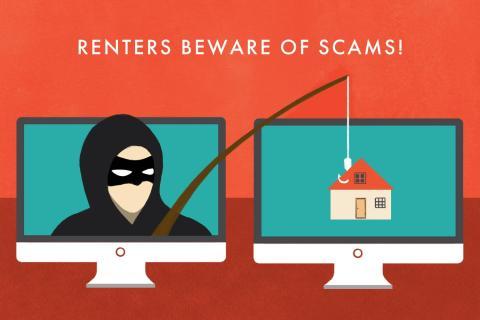Beginning a new school year is an exciting and challenging time. For many of us, it means that we need to find new housing and part-time jobs while adjusting to a new city and schedule. While this can lead to many new opportunities and friendships, it can also be very stressful, and scammers can try to take advantage of this stress, making students prime targets. There has been a recent increase in scams that target students, with the two most common scams relating to housing/leasing and employment. Please refer to the tips below to reduce your risk of becoming a victim of a scam:
- Avoid using Facebook and Craigslist. Off-Campus Housing is a great resource that is monitored regularly by the university.
- Ask for a tour of the property. If the landlord refuses or tries to send pictures instead, that may be an indicator of a scam.
- Don’t pay with cash. Cash payments aren’t traceable and are a common tactic used by scammers.
- Demand a written lease, and make sure you read through it! Check for any spelling or grammar errors and make sure the lease identifies the owner or rental company.
- Utilize Student Legal Services! All University of Michigan students have access to this invaluable resource, and the lawyers on staff would be happy to look over any lease that you have concerns about before you sign.
If you would like more information about finding housing or signing a lease, feel free to check out our Take Time Before You Sign videos or contact Student Legal Services by calling 734-763-9920 or requesting an appointment online. If you believe you’ve been scammed or you notice anything suspicious, please visit the Federal Trade Commission's website to file a complaint.
Employment scams are another type of scam to watch out for. Scammers have recently been sending emails to students offering a job and a check to buy supplies. While the check is pending in the student’s account, the student is expected to buy and send supplies to the employer or return a portion of the money. After the money has been sent, the student learns that the check was invalid and that they have been scammed. Some tips to avoid similar employment scams are:
- Don’t trust job offers that you didn’t interview for. Employers want to get to know someone before they hire them, and this typically involves reading a resume and conducting an interview.
- Don’t accept jobs you didn’t apply for. It can be difficult to remember every job you’ve applied for when you’re job-hunting, and scammers are aware of this. Try to keep a list of the jobs you’ve applied for so that you can refer back to it when necessary.
- Double check the email. Scammers have learned to impersonate University of Michigan staff by using similar emails. These fake emails will often contain a staff member's name with “umich.edu” but end with a different email address. For example, rather than “[email protected]”, the email address might be “[email protected]”. It’s a subtle trick, which can catch people out if you only happen to glance at the sender’s name and information.
- Don’t give out personal information up front. If a potential employer is asking for your social security number, it’s a scam. Any background checks or employment verification should take place AFTER you were hired.
- Never send money! Asking for money is a major red flag that the job opportunity is a scam.
For more information on employment scams, check out this article on Phishing & Suspicious Emails. If you receive a job offer that you think might be a scam, reach out to the Division of Public Safety and Security (DPSS) at 734-763-1131 or email at [email protected].

